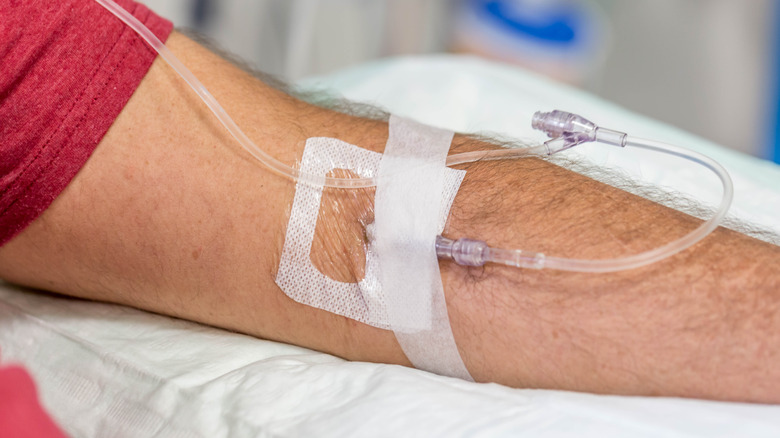What Is Guillain-Barré Syndrome?
Guillain-Barré syndrome (GBS) is a rare neurological disorder that causes your immune system to attack healthy nerve cells located in the peripheral nervous system, which involve the nerves located outside the spinal cord and brain. Currently, the three types of the disorder are acute inflammatory demyelinating polyradiculoneuropathy, Miller Fisher syndrome, acute motor axonal neuropathy, and acute motor-sensory axonal neuropathy (via Mayo Clinic).
Symptoms of GBS appear quickly and begin with a tingling in the toes, feet, and legs. Tingling occurs because the damaged nerves are unable to communicate with muscles. The sensation works its way up the torso into the arms and fingers. About 10% of the people diagnosed with the condition experience tingling in the face and arms first. GBS can cause difficulty breathing, walking, chewing, swallowing, and talking. Other symptoms include loss of bladder control, and a quickened heart rate (via Healthline).
As the syndrome advances, paralysis is possible, according to the Mayo Clinic. Anyone suspecting they might have GBS should seek immediate medical attention, and those diagnosed with it are promptly hospitalized (via Johns Hopkins Medicine).
Guillain-Barré syndrome: Causes and treatment
It is not known what causes GBS, but some people diagnosed with it had some type of infection — like gastroenteritis or a respiratory infection — leading up to their diagnosis (via Mayo Clinic). The Centers for Disease Control and Prevention reports that around two-thirds of patients diagnosed with GBS had diarrhea several weeks before developing it. In rare cases, certain vaccines, including the Johnson & Johnson COVID-19 vaccine, have triggered the condition (via CNN). While GBS can affect anyone, it appears mostly in people over the age of 50, the CDC revealed.
Healthline describes GBS as self-limiting, which means it should clear up on its own. That being said, hospitalization is required for monitoring because if paralysis affects the chest muscles or diaphragm, it could be life-threatening. Treatments to help the immune system include a plasma exchange and immunoglobulin therapy, which remove the antibodies that are attacking the nerves (via Healthline). Patients are also given medication to reduce pain and prevent blood clots.
About 80% of the people diagnosed with GBS will walk again after six months of treatment, and up to 60% recover most of their motor skills within a year. Around 5 to 10% never fully recover or have significant trouble recovering (via Medscape).


